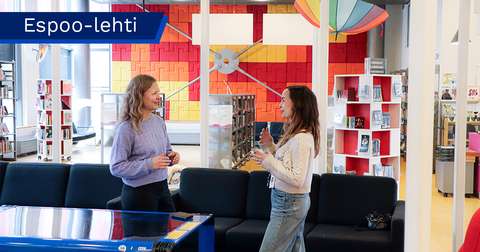My space too

Everyone who works at or attends cultural events in Espoo commits to complying with principles for a safer space. The purpose of these principles is to create a welcoming atmosphere for everyone.
The Cultural Unit was the first one in Espoo to implement principles for a safer space, followed by Sports and Exercise, Economic Development and Employment Services.
“We have thought about these principles before but putting them down in clear words in one document makes it easier to implement them in our premises,” says Leila Koivukangas, Manager of Children’s and Youth Services at the Sello Library.
This does not mean that cultural venues and events used to be unsafe and separate rules were needed to address the problem. The principles for a safer space are a natural part of the equality and inclusion work carried out by the Cultural Unit. One of the employees working on these themes is Marika Torniainen.
“I am pleased with the Espoo City Council’s decision to implement these principles in all its units this spring,” Torniainen says.
A concrete tool
At the Sello Library in Leppävaara, the principles for a safer space are displayed in Finnish, Swedish and English right by the main entrance. The staff have received training on the topic, and further training on relevant matters is arranged annually.
“Our training topics have included microaggressions from the point of view of anti-racism and the identification and prevention of sexual harassment,” Torniainen explains.
The training sessions can go into details, such as the use of certain words in situations where you want to politely but firmly make it clear that you will not tolerate bad behaviour.
“Examples of cases in which our staff have had to intervene include degrading comments and racist opinions disguised as jokes,” Leila Koivukangas says.
She has nearly 20 years of experience working with the wellbeing of children and young people. She has noticed that it is easier to intervene in the activities of children and young people than in conflicts between adults.
“That’s why it’s important to have common rules that you can refer to when someone behaves disrespectfully. Of course, everyone has the right to their personal opinions, but the freedom of speech may sometimes collide with common courtesy required in public spaces,” she continues.
The library has received positive customer feedback on the principles, but there are also some people who oppose them.
Together as a community
“People have asked us whether such rules really are necessary. The answer is yes, because there are still people in our society who face disrespectful treatment,” Torniainen says.
The project started in 2022 as a result of several discussions and exchanges of ideas, reflecting developments taking place in society as a whole.
“We want to ensure that our cultural services are accessible to everyone. We have a strong customer focus in our work, so it’s essential that everyone feels included.”
The principles have not been dictated by officials or decision-makers. Instead, they are a product of various surveys, interviews and workshops to which all units have been invited. They have been drawn up jointly by the entire community. An inclusion specialist prepared the interview questions, and the preparation process continued in a work group based on the interviews.
“We want to develop a customer experience that leaves everyone feeling good after visiting our premises,” Torniainen summarises.
Leila Koivukangas emphasises that principles for a safer space actually apply everywhere, and she encourages everyone to talk about them with their children at home.
Read more: CultureEspoo's principles for safer space
Text: Nora Gullmets
This article was originally published in the Espoo-lehti magazine 2/2025. Read other Espoo-lehti articles.